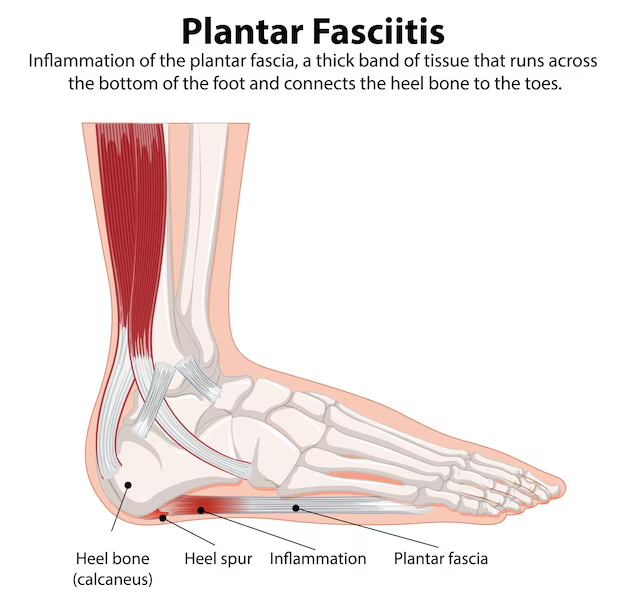As awareness about exercise and weight management increases, many people look forward to getting outdoors and engaging in more physical activities. However, for those with plantar fasciitis, the pain can put a damper on these plans. Plantar fasciitis is a common condition affecting the foot’s heel area, often caused by inflammation of the plantar fascia—a thick band of tissue connecting the heel bone to the toes. Dr. Sudhir Kapoor, a renowned orthopaedic specialist in Delhi, offers effective solutions for combating plantar fasciitis, helping patients stay active and pain-free.
In this blog, we’ll explore what plantar fasciitis is, tips for managing the condition, and how Dr. Kapoor’s expertise can help you enjoy a summer free from heel pain.
What is Plantar Fasciitis?

Plantar fasciitis occurs when the plantar fascia becomes inflamed or damaged. The condition is commonly seen in individuals who:
- Have flat feet or high arches
- Spend long hours standing, walking, or running
- Wear shoes with inadequate support
- Are overweight, placing extra stress on the feet
Symptoms of plantar fasciitis typically include sharp, stabbing heel pain, especially in the mornings or after periods of rest. This discomfort can significantly impact daily activities, from walking to running.
Tips for Managing Plantar Fasciitis Ahead of Summer
Dr. Sudhir Kapoor recommends several preventive and management strategies to help reduce plantar fasciitis symptoms, allowing patients to stay active without exacerbating the condition.
1. Wear Supportive Footwear
Choose shoes with good arch support and cushioned soles to relieve pressure on the heel. Avoid walking barefoot on hard surfaces, as it can worsen the inflammation. For summer activities, consider orthopaedic sandals or athletic shoes designed to reduce impact on the plantar fascia.
2. Incorporate Foot Stretches and Exercises
Stretching the plantar fascia and Achilles tendon can significantly reduce pain. Dr. Kapoor advises performing these exercises daily to strengthen the muscles around the foot and ankle:
- Toe Stretch: Sit with one leg crossed over the other. Gently pull back on the toes of the affected foot to stretch the arch.
- Calf Stretch: Stand facing a wall with one leg extended behind you, keeping your heel on the ground. Lean forward to stretch the calf muscle and Achilles tendon.
- Rolling Massage: Roll a tennis ball or a frozen water bottle under the arch of your foot for a soothing massage that helps release tension in the plantar fascia.
3. Maintain a Healthy Weight
Excess weight can put additional strain on the feet, making plantar fasciitis symptoms worse. Dr. Kapoor emphasises the importance of a balanced diet and regular exercise to maintain a healthy weight, which can ease pressure on the plantar fascia and reduce inflammation.
4. Use Orthotic Insoles
Custom or over-the-counter orthotic insoles provide added support and cushioning, reducing strain on the plantar fascia. Dr. Kapoor can recommend specific orthotic options based on your foot shape and lifestyle needs, helping to alleviate heel pain during summer activities.
5. Practice Activity Modification
Summer is a time for outdoor fun, but it’s important to modify activities to avoid overloading the plantar fascia. Engage in low-impact exercises like swimming or cycling that put less strain on the feet, or alternate high-impact activities with rest to minimize pain and inflammation.
Dr. Sudhir Kapoor’s Expertise in Plantar Fasciitis Treatment in Delhi
With over 40 years of experience, Dr. Sudhir Kapoor has helped countless patients in Delhi manage and overcome plantar fasciitis. His patient-centred approach ensures that every treatment plan is tailored to the individual’s needs and lifestyle. Dr. Kapoor emphasizes non-surgical treatments, focusing on rehabilitation and preventive care to help patients regain mobility and lead active lives.
At his clinic, Dr. Kapoor provides a range of effective treatment options, including:
- Physical Therapy: Specialized exercises and stretches to alleviate pain and strengthen the plantar fascia.
- Extracorporeal Shock Wave Therapy (ESWT): A non-invasive procedure that uses sound waves to promote tissue healing.
- Corticosteroid Injections: Targeted injections to reduce severe inflammation and provide temporary pain relief.
- PRP injections: Extract from the patient’s own blood can be injected , wherever indicated for the treatment of plantar fasciitis
Why Choose Dr. Sudhir Kapoor for Plantar Fasciitis Care?
Dr. Kapoor’s extensive career includes leading roles at renowned institutions such as Maulana Azad Medical College and LNJP Hospital, Lady Hardinge Medical College, ESI Hospital in Basaidarapur, and the Indian Spinal Injury Centre in Delhi. His expertise in orthopaedic care, coupled with a compassionate, patient-focused approach, makes him a trusted choice for individuals struggling with plantar fasciitis. Dr. Kapoor’s commitment to non-surgical, personalized treatment plans enables patients to manage pain effectively and enjoy an active lifestyle.
Conclusion
Don’t let plantar fasciitis hold you back from enjoying the summer months. By following Dr. Sudhir Kapoor’s expert advice on footwear, exercises, weight management, and activity modification, you can effectively combat plantar fasciitis and reduce heel pain. If you’re experiencing persistent heel pain, schedule a consultation with Dr. Kapoor for a comprehensive assessment and a tailored treatment plan.





